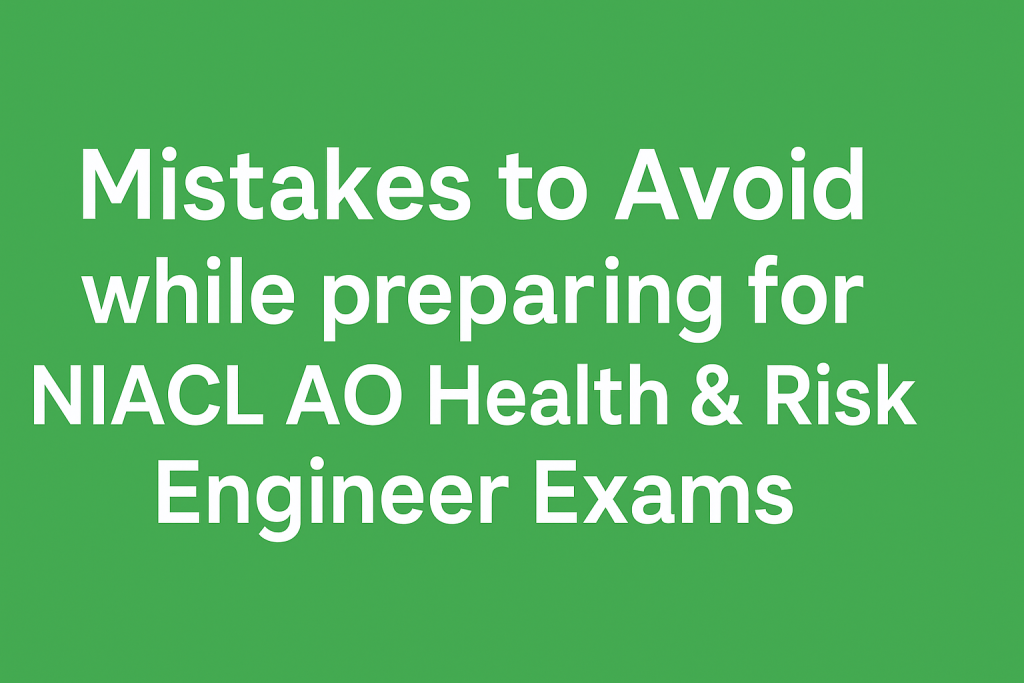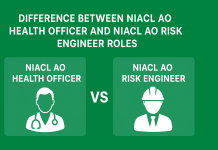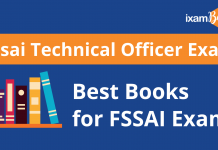The NIACL AO Health specialist and Risk Engineer exams present a golden opportunity for candidates with a background in health sciences, biomedical engineering, or risk management. It offers a stable career, an attractive salary, and growth in one of India’s leading public sector insurance companies.
However, many aspirants struggle to clear this exam, not because of lack of talent but due to avoidable mistakes during preparation. Knowing what to avoid is as important as knowing what to study. In this blog, we will highlight the common mistakes candidates make while preparing for the NIACL AO Health specialist and Risk Engineer exams and how you can overcome them.
The competition for this exam is intense. Thousands of candidates appear every year, but only a few secure the limited vacancies. Even small mistakes can reduce your chances of success. If you want to maximize your score and stay ahead, you must be careful about your preparation strategy.

NIACL AO Health Specialist and Risk Engineer Exams: Common Mistakes
Let’s now take a close look at some common mistakes that aspirants make while prepping for either the Risk Engineer or Health Specialist Exams in NIACL AO.
Ignoring the Syllabus and Exam Requirements
One of the most common mistakes candidates make is not going through the official NIACL AO exam pattern & syllabus carefully. Many aspirants spend too much time on general subjects like aptitude and reasoning, but neglect the technical section that is specific to the NIACL AO Health Specialist and Risk Engineer exams. Without clarity on the syllabus, preparation becomes scattered, time gets wasted on irrelevant topics, and the most scoring areas are missed. The best way to avoid this is to download the official syllabus from the notification, break it into smaller topics for daily study, and give special attention to healthcare systems, insurance basics, and biomedical engineering concepts.
Overdependence on General Study Material
Another mistake candidates often make is relying only on common banking or insurance exam books. While these resources are useful for prelims, they are not sufficient for the specialist section. The technical part of the exam demands subject-specific knowledge, and general books do not cover biomedical engineering, medical risk evaluation, or healthcare policies in enough depth. To overcome this, aspirants should use standard reference books from their own field of study, consult government health scheme documents, and refer to the NIACL AO Recruitment guidelines. Balancing preparation between general and technical subjects is the key.
Neglecting Time Management
Many aspirants work hard but fail to manage their time properly. They spend weeks on a single subject while ignoring others, which creates an imbalance in preparation. Since the NIACL AO Health Specialist and Risk Engineer Exams test multiple areas, focusing too much on one subject can leave a candidate unprepared for the rest. This can be avoided by creating a weekly study plan that covers all subjects, allocating fixed time slots for aptitude, English, reasoning, general awareness, and technical topics, and taking timed practice tests to build speed and accuracy.
Not Practicing Previous Year Papers
Reading theory without solving NIACL AO previous year papers is another serious mistake. The exam may appear easy in theory, but real questions test your ability to apply knowledge within a limited time frame. Without practice, it is difficult to judge the actual level of the paper or your readiness. Candidates should therefore solve at least five to ten previous year papers, analyze mistakes after each attempt, and focus on weak areas through repeated revision.
Weak Focus on Current Affairs and Insurance Updates
Aspirants often underestimate the importance of current affairs and insurance awareness, treating them as last-minute topics. This is a costly mistake because these sections carry direct marks and also play a vital role in the interview stage, where questions on recent healthcare and insurance trends are common. To avoid this, candidates must develop the habit of reading newspapers daily with a focus on healthcare, the economy, and government schemes. Monthly current affairs magazines and updates from platforms like BeePedia can further strengthen this section.
Ignoring Mock Tests and Practice Sessions
Many candidates delay mock tests until the final stage of preparation, fearing low scores. They wait until they feel “fully prepared” before attempting one. This approach is flawed because NIACL AO mock tests are not only for evaluation but also for learning. They reveal weak areas and improve exam temperament. Candidates should start with one mock test a week, gradually increase the frequency to two or three per week, and carefully analyze the time spent on each section to improve performance.
Overlooking Interview Preparation
Some aspirants focus entirely on the written exam and neglect interview preparation, which is equally crucial. Even after clearing the mains exam, poor performance in the interview can result in rejection. To avoid this mistake, candidates should start preparing early by revising core subjects, healthcare policies, and principles of risk management. They should also practice answering common interview questions with confidence and, if possible, conduct mock interviews with peers or mentors to build comfort.
Studying Without Revision
A common mistake among serious aspirants is studying new topics daily without regular revision. Without revision, much of the knowledge fades, and during the exam, candidates may recall concepts only partially, leading to errors. To prevent this, revision must be included in the study plan. Dedicating at least one day a week for revision, preparing short notes or mind maps for quick recall, and revisiting technical formulas, healthcare terms, and insurance rules regularly can make a big difference.
Not Maintaining Health During Preparation
In the race to complete the syllabus, many candidates neglect their health. They study long hours without breaks, eat irregularly, and compromise on sleep. Poor health reduces concentration and productivity, and a tired mind cannot perform at its best in the exam. The solution is to maintain a balanced routine that includes study, rest, and light exercise. Eating healthy food, staying hydrated, and taking short breaks during long study sessions will help maintain both physical and mental fitness.
Last-Minute Rushing
Finally, a big mistake is leaving technical topics or current affairs for the last moment and rushing through them just before the exam. This creates stress and confusion, and often, even well-prepared topics get mixed up. The right approach is to stick to a planned schedule, complete the syllabus at least two weeks before the exam, and use the final days only for revision and mock tests. This ensures confidence and clarity on exam day.
NIACL AO Health & Risk Engineer Exams Mistakes vs. Solutions
If you’re feeling confused about the number of mistakes you’re making in your NIACL AO Health Specialist and Risk Engineer Exams preparation, take a look at the table below and get an idea on the problem and your solution for it:
| Common Mistake | Why It’s a Mistake | Solutions |
| Ignoring syllabus | Wastes time on irrelevant topics | Follow official syllabus carefully |
| Using only general books | Miss specialist preparation | Refer to technical and healthcare resources |
| Poor time management | Unbalanced preparation | Create a study plan with equal focus |
| Skipping past papers | No real exam practice | Solve at least 5–10 papers |
| Weak current affairs prep | Lose easy marks | Read daily news and follow insurance updates |
| Avoiding mock tests | No speed/accuracy improvement | Attempt mocks regularly |
| Neglecting interview prep | Risk losing job despite clearing mains | Prepare for technical + HR questions |
| No revision | Forget concepts | Weekly revision with notes |
| Ignoring health | Low focus and productivity | Maintain balanced lifestyle |
| Last-minute cramming | Stress and confusion | Finish syllabus early and revise |
Summing Up
The NIACL AO Health & the Risk Engineer exam requires a balanced strategy. While studying hard is important, avoiding common mistakes is equally critical. Candidates often fail not because of lack of knowledge but due to poor planning, skipped revisions, or weak exam strategy.
If you want to succeed, stay focused on the syllabus, manage your time well, practice mock tests, and keep yourself updated with healthcare and insurance news. Most importantly, maintain your health and confidence throughout the journey.
By being aware of these pitfalls and following the right approach, you can increase your chances of success and secure a prestigious position as a Health Officer or a Risk Engineer in NIACL.
ixamBee specializes in providing expert guidance and resources for banking exams 2025, ensuring that you are well-prepared for the Upcoming Bank Exams like RBI Grade B, NABARD Grade B, IBPS SO, and more. Our courses align with the bank exam calendar 2025, covering all the essential topics. With a focus on the upcoming bank jobs, our Previous Year Papers, BeePedia, SSC CGL, SSC CHSL, SSC MTS and other Mock Tests are designed to help you excel in upcoming banking exams.
Also Read:
LIC AAO Vs. NIACL AO 2025: Eligibility, Exam Pattern, Salary, and Career Growth
Why Choose a Career as NIACL AO Health & Risk Engineer? A Complete Guide
How to Prepare for the CBI APP Exam 2025 : Your Ultimate Guide to Success













